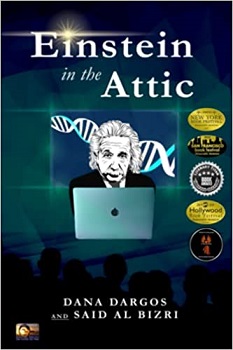God Complex by Dana Dargos – Guest Post
God Complex by Dana Dargos – Guest Post
Today we welcome author Dana Dargos with her guest post ‘God Complex: The Hubris of Scientists Who Play at Being Deities’. Check out her post below and her new book Einstein in the Attic which was released last year. – This post contains affiliate links.

Dana Dargos is an award-winning Lebanese-American writer born and raised in the Bay Area. From the moment she created adventurous, crayon-scribbled tales in kindergarten, she knew writing would forever be a part of her life. She graduated from UC Berkeley with a degree in English Literature. Einstein in the Attic is her debut novel.
God Complex: The Hubris of Scientists Who Play at Being Deities
Creating artificial life is a fascinating concept that could revolutionize the world, but it also raises ethical, religious, and societal questions. For example, would creating human clones for the purpose of harvesting their organs and providing their spare parts, such as hearts, lungs, and livers to people in need be going too far? Would that be crossing the line and playing the role of God?
To explore this question, we must first analyze the foundation it is based on: scientists and the concept of God. Science has achieved many great feats in history, from vaccines to space exploration, pushing the limits of what is possible. Because of this, many members of the scientific community argue against the notion of an intelligent designer, stating that our own power eliminates the need for a divine force. Additionally, the existence of evolutionary fossils leads to further arguments against the existence of a God, prompting scientists to question why they should worry about “playing God” if there is no God.
However, this can actually be countered by various pieces of evidence that actually suggest the existence of an intelligent designer, such as the lack of intermediary fossils, irreducible complexity, and the origin of the DNA code. However, such evidence is often ignored due to either overlooked research or mere close-mindedness. This is because many scientists are so entirely against the possibility of an intelligent designer that they dismiss research that conflicts with their own findings, reject contrasting beliefs without meaningful engagement, and disregard important research due to their overconfidence in their abilities, dogmatic beliefs, and biased opinions. This sense of hubris can have serious implications for scientific inquiry.
It can result in missed opportunities for scientific advancement and innovation. When scientists become too entrenched in their own beliefs, biases, and opinions, they may be less likely to consider new ideas and research that challenge their established views, skewing their research. This can lead to stagnation in certain fields and a lack of progress in addressing critical issues facing society, similarly presented in the novel, “Einstein in the Attic” by Dana Dargos and Said Al Bizri.
In the novel, the main character, Professor Adam Reemi is thrust into a high-stakes debate with philosophers zapped from the past, (Albert Einstein, Soren Kierkegaard, Baruch Spinoza, and Isaac Newton), and pitted face-to-face against the head of the all-powerful, Scientific Excellence Organization (SEO), Walter Nelson, in a world-wide debate regarding intelligent design. There, Adam finds himself in a race against time to formulate an answer to the question of intelligent design… or risk losing everything. Nelson is portrayed in “Einstein in the Attic” as a character who represents the scientific community’s hubris and mainstream view of evolution and who is unwilling to accept the possibility of an intelligent designer. Nelson’s character is presented as being arrogant and dismissive towards the concept of an intelligent designer, believing that evolution is the only plausible explanation for the origin of life. He is determined to discredit Adam and his team’s arguments in the debate and win at all costs, even if it means resorting to underhanded tactics.
If you’re looking for a thrilling and thought-provoking read that challenges conventional views on evolution and intelligent design, look no further than “Einstein in the Attic”. Through the character of Professor Adam Reemi, the novel explores the complex relationship between science and faith, as well as the dangers of scientific hubris. With fascinating discussions on intermediary fossils, irreducible complexity, and the origin of the DNA code, “Einstein in the Attic” is a must-read for anyone interested in the intersection of science and philosophy. In fact, the book’s examination of the limits of scientific knowledge and the significance of humility in scientific inquiry aligns with the idea that there are still many mysteries that remain unsolved, despite the tremendous progress made by science in understanding the world around us. Scientists must therefore approach their work with humility and a sense of responsibility, recognizing that there is much that they do not yet know.
Publisher – Solstice Publishing
Pages – 366
Release Date – 20th January 2022
ISBN 13 – 979-8410620048
Format – ebook, paperback

A search for truth by those that transcend time.
Set against the backdrop of the war between science and God, reason and faith, Einstein in the Attic is the story of one scientist’s search for truth and meaning when faced with the ultimate question: Is there a God? Fleeing war-torn Lebanon, Adam Reemi’s faith is shaken by the hardships he has endured, but when he and a colleague successfully construct a nano hadron collider, and using sound waves, Adam finds unheard-of power at his fingertips.
To help him answer the greatest question mankind has ever posed, he zaps the best philosophical minds of all time–namely Albert Einstein, Isaac Newton, Soren Kierkegaard, and Baruch Spinoza–from the past and into his attic. Not all goes according to plan, however, and Adam finds himself in a race against time to formulate an answer to the question of intelligent design… or risk losing everything.
Purchase Online From:
Author Links
TikTok
Website





